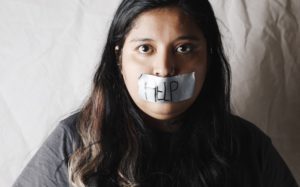 Life is hard: we can’t deny it. Each day brings with it the potential for disappointment, betrayal, emotional setbacks, and financial obstacles. Every person on the planet experiences negativity and every person knows what it’s like to draw the short end of the stick in an array of situations. We’ve all been the victim in one way or another. However, the most damaging obstacles in life may be the ones we create for ourselves when we permanently adopt the identity of a ‘victim’. Are you familiar with victimhood?
Life is hard: we can’t deny it. Each day brings with it the potential for disappointment, betrayal, emotional setbacks, and financial obstacles. Every person on the planet experiences negativity and every person knows what it’s like to draw the short end of the stick in an array of situations. We’ve all been the victim in one way or another. However, the most damaging obstacles in life may be the ones we create for ourselves when we permanently adopt the identity of a ‘victim’. Are you familiar with victimhood?
Living in the Dark
The beliefs we adopt when we take on a victim identity box us into rigid mental environments where we can’t persevere through hardship. Essentially, victimhood is a small, dark place where we force ourselves to grope around without goals or responsibilities that shed light on our next movements.
When we play the victim, no one understands us, everyone is out to get us, and we can’t trust anyone. As victims we’re inadequate, vulnerable, small, and incapable of solving our own problems.
Having a victim mentality looks like this:
- We experience hurt more intensely and for much a longer time than most people do
- We easily and often recall those feelings of hurt
- We respond more strongly and more quickly to negativity
- We hold more grudges and for a longer amount of time
- We seek revenge more often
- We create more reasons to continue in our addictions
These mental formations pose real challenges for effective recovery and treatment for substance abuse disorders.
People who are victims of mistreatment, crime, or uncontrollable disasters cannot and should not be blamed or held responsible for the injustices that befall them.
Would we blame a victim of rape for the rape? Certainly not. Would we blame a victim of armed robbery for the robbery? No way. Would we blame the victim of a drunk driving accident for the drunkenness of the other driver? Never.
When people experience these kinds of events, it’s important that they receive the care they need to learn how to move beyond the fear and the trauma. With therapy and support, they learn that even though they can’t change the past, they can still influence their present.
People who get stuck in a victim mentality believe that they can’t change their future or their present. Their role as the oppressed person strips them of autonomy in every context.
In a way, choosing to be or remain a victim can be a way to avoid responsibility in the long run.
A victim mentality plays a role in addiction for many people. Most people who struggle with addiction have been victims of some kind: of trauma or of mental illness, for example. The problem happens when they allow their identity as a victim to keep them from taking full responsibility for the choices that led them to addiction or substance dependency–and to keep them from seeking treatment.
So how do we release a victim identity and step into a lighter, more hopeful, and more powerful place?
Stepping into the Light
Creativity is a good first step. In this sense, being creative means having the imagination to step outside of the tiny box of victimization that blinds us from our independence and individual power.
When we embrace a creative mentality, we expand our reality and entertain ideas that lead us away from old, often toxic, patterns.
Someone who has a victim mentality tends to brood on the wrongdoings against them. Often, they fail to empathize with loved ones who care for them. Being creative means being empathetic. It means trying to see reality from another person’s point of view. It means imagining a reality that is uplifting and positive. In short, creativity can repel victimhood and addiction.
Embracing Creativity
In addition to creative thinking, doing creative work can also help relieve the pattern of victimhood. Creative spaces wherein we listen to and make music, paint, write, read, visit museums, create crafts, play, act, and sing show us that we can step outside of our reality for a moment. Later we can re-enter renewed and fresh with perspective. We can engage with ourselves and others in these creative environments.
Creative therapies assist people in expressing and accepting their traumas as difficult experiences in the past. Letting go of the past and embracing the present illuminates the path to sobriety and successful recovery.
Creative Changes
When we opt out of victimhood and into a creative approach to recovery and sobriety, we do the following:
- Open ourselves to new possibilities, gravitating toward intrinsic self-worth rather than a need for external validation.
- Humble ourselves and steer away from judging others as if we were superior emotionally due to the traumas we’ve sustained.
- Empathize more, leading to forgiveness and a release of bitterness that previously fueled our addiction.
- Leave the past in the past and do away with ruminating over events we can no longer change.
Creativity In Recovery at Great Oaks
Here at Great Oaks, we know that creativity is key in helping our clients overcome substance use disorders. We offer an array of activities and therapies that promote creativity and open-mindedness. Through equine, group, humor, individual, and recreational therapy, numerous opportunities exist to combat victim mentality with originality and lightness.



